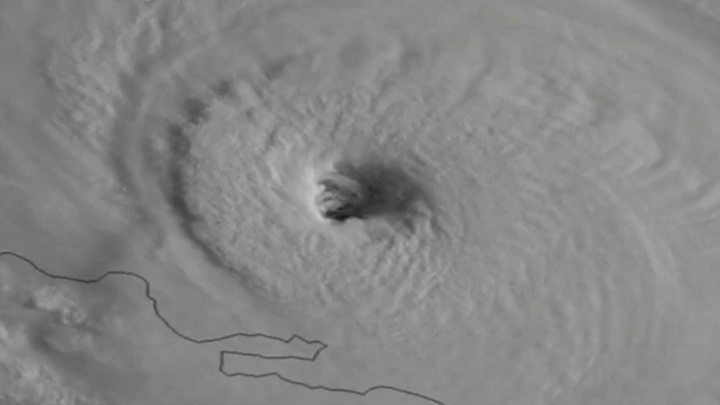
Hurricane Irma has pummelled the Turks and Caicos Islands after leaving a trail of destruction across the Caribbean, killing at least 14 people.
The low-lying islands are said to be at risk of a storm surge, with the possibility of destructive waves up to 6m (20ft) higher than usual.
There has been some damage and flooding in Haiti, where the infrastructure has yet to recover from a devastating earthquake in 2010.
Irma is a category five hurricane.
This is the highest possible level for a hurricane, and its winds are travelling at up to 175mph (280km/h).
An estimated 1.2 million people have been affected by Irma and that could rise sharply to 26 million, the Red Cross says.
There are concerns that disease could spread rapidly in areas where drinking water and sanitation services have broken down, and officials have warned that the death toll is likely to rise.
What's next in Irma's path?
Irma is near the Turks and Caicos Islands and is projected to move towards the Bahamas.
The storm is predicted to reach Cuba next, before hitting the US state of Florida at the weekend, with the head of the US emergency agency predicting a "truly devastating" impact.
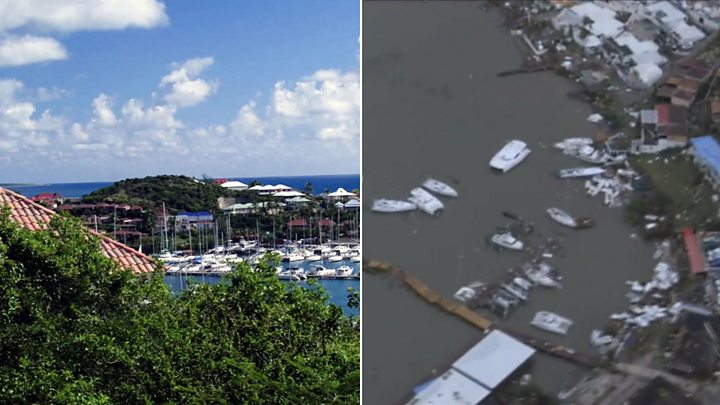
Preparations for the arrival of Irma were carried out in the Turks and Caicos, a British overseas territory with a population of about 35,000. Its highest point is only 50m (163ft).
Governor John Freeman said: "[We] decided to evacuate certain islands which were particularly low-lying and at threat." Those evacuated had been sent to shelters.
Virginia Clerveaux, director of the Turks and Caicos Department of Disaster Management and Emergencies, said that even inland areas could be inundated by the storm surge.
"We are expecting inundation from both rainfall as well as storm surge. And we may not be able to come rescue [residents] in a timely manner."
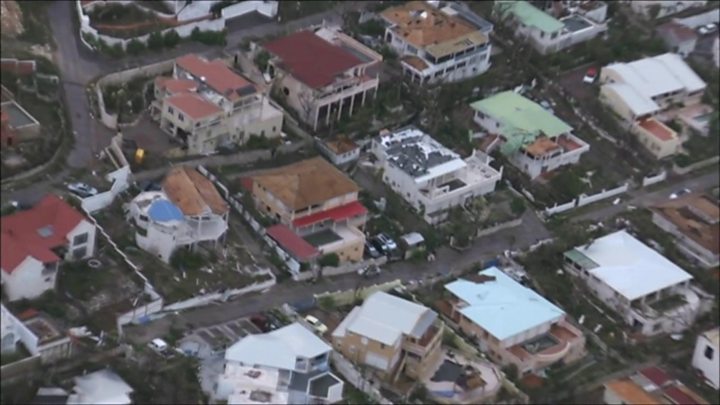
Irma also caused some damage to roofs, flooding and power outages to the northern parts of the Dominican Republic and Haiti.
In Cuba, thousands of tourists from coastal resorts in the exposed part of the island have been evacuated.
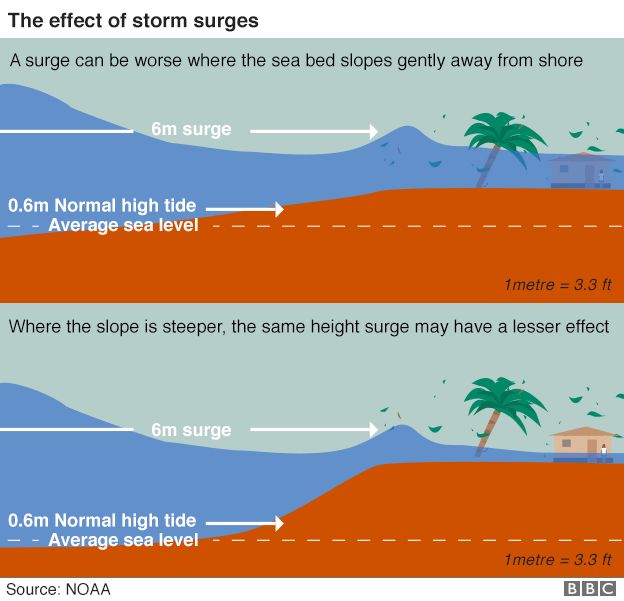
Britain, France, and the Netherlands have sent ships, rescue teams and emergency supplies to their territories that have been hit by Hurricane Irma.
Aid efforts are being hampered by damage to local airports and harbours.
Which areas have been hit?
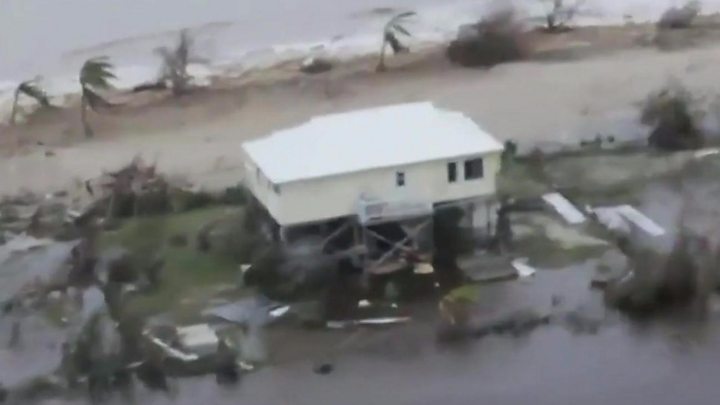
- Barbuda: the small island is said to be "barely habitable", with 95% of the buildings damaged. Prime Minister Gaston Browne estimates reconstruction will cost $100m (£80m). One death has been confirmed
- St Martin: the island that comprises the French territory of Saint-Martin and the Dutch section Sint-Maarten suffered terrible damage. Five people have been killed
- Puerto Rico: more than 6,000 residents of the US territory are in shelters and many more without power. At least three people have died
- US Virgin Islands: damage to infrastructure was said to be widespread, with four deaths confirmed
- Anguilla: one resident said the island, a British overseas territory, looked as if it had been struck by a nuclear bomb. One person has died
- British Virgin Islands: a state of emergency has been declared and fatalities are expected
What the US can expect
Irma is expected to hit Florida as a category four hurricane on Sunday, bringing storm surges and flooding.
"If you look at the size of this storm, it's huge," Florida Governor Rick Scott said on Thursday. "It's wider than our entire state and could cause major and life-threatening impacts on both coasts - coast to coast."
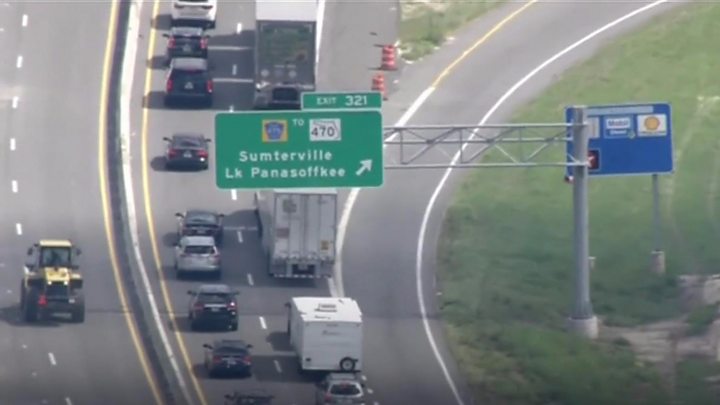
US President Donald Trump said: "I can say this: Florida is as well prepared as you can be for something like this. Now it's just a question of what happens."
Evacuations of tourists and residents of the Florida Keys, a resort archipelago, have begun.
Flights to and from airports in Florida are being suspended. Orlando's international airport said commercial flights would stop from 17:00 local time (21:00 GMT) on Saturday.
Islands still at risk from Irma
Haiti
- Population: 10.2 million
- Key facts: on the same island as the Dominican Republic; devastated by an earthquake in 2010
- Hurricane prediction: not directly in the hurricane's path, but still vulnerable
Turks and Caicos
- Population: 31,500
- Key facts: enjoys one of the more dynamic economies in the region thanks to upmarket tourism, offshore finance and fishing
- Hurricane prediction: the low-lying region is at risk of a storm surge with destructive waves up to 6m (20ft) higher than usual possible
Cuba
- Population: 11 million
- Key facts: one of the world's last planned economies; a producer of sugar, tobacco and coffee, with a big tourism industry
- Hurricane prediction: Tropical storm conditions expected to begin on Thursday night (local time)
Bahamas
- Population: 350,000
- Key facts: an archipelago of more than 700 islands and islets, which attracts millions of tourists per year
- Hurricane prediction: warnings for north-west, south-east and centre; some areas have risk of storm surge of up to 6m (20ft)
Are there more hurricanes to come?
Another storm, Jose, further out in the Atlantic behind Irma, has been upgraded to category three strength, and could pass close to many areas already hit by the severe weather.
Storm Katia, in the Gulf of Mexico, was also upgraded to hurricane status, and a warning was in effect for the coast of the Mexican state of Veracruz.
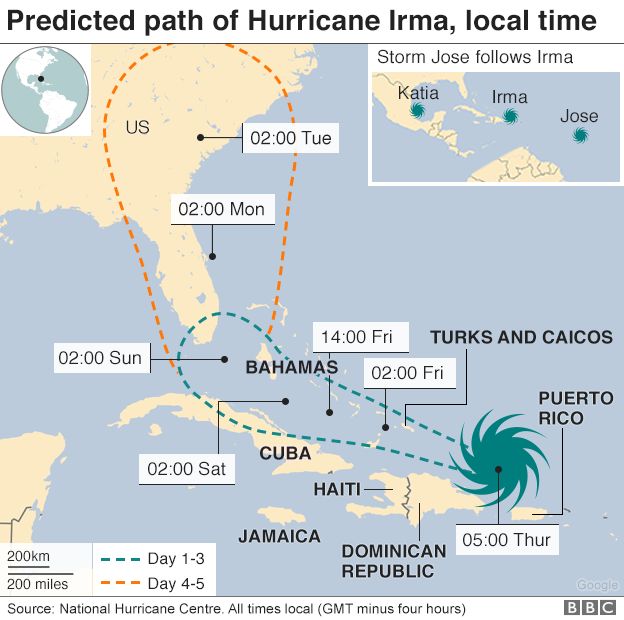
Are you in the region? Are you a holidaymaker unable to get a flight home or a resident who has been preparing for Hurricane Irma? If it is safe for you to do so, share your experiences by emailing haveyoursay@bbc.co.uk.
Please include a contact number if you are willing to speak to a BBC journalist. You can also contact us in the following ways:
- WhatsApp: +447555 173285
- Tweet: @BBC_HaveYourSay
- Send pictures/video to yourpics@bbc.co.uk
- Upload your pictures / video here
- Send an SMS or MMS to 61124 or +44 7624 800 100
BBC News
No comments:
Post a Comment